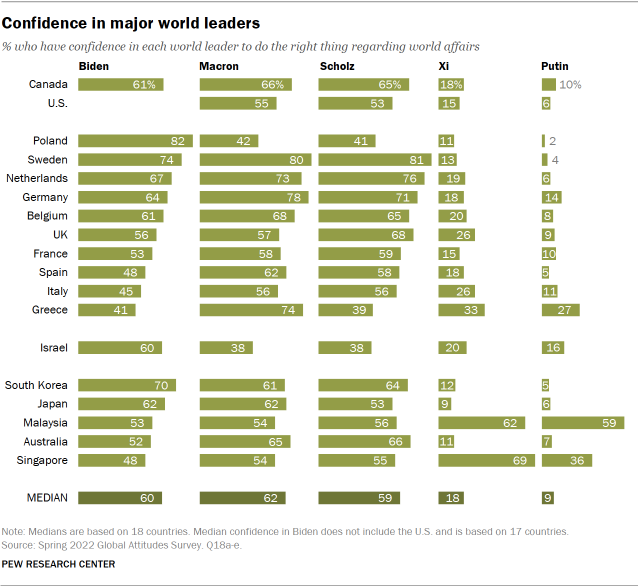To place the ratings of Biden and Putin in perspective, the survey also asked people to rate three other major world leaders: French President Emmanuel Macron, German Chancellor Olaf Scholz and Chinese President Xi Jinping.
Similar to ratings of Biden, a median of 62% have confidence in Macron and 59% have confidence in Scholz to do the right thing in world affairs. Ratings of both European leaders are particularly high in Sweden, the Netherlands and Germany, and more than half in nearly every country surveyed have confidence in each leader. The exceptions are Israel and Poland, where only around four-in-ten trust either to do the right thing, and Greece, where a similarly small share has confidence in Scholz.

In most countries, trust in Scholz is much lower than it was in former German Chancellor Angela Merkel during her last year in office. Fewer people express an opinion about Scholz in general in most places, but this only partly explains the lower levels of trust. For example, more people in Spain did not provide a rating of Scholz this year (6%) compared with Merkel last year (1%), but the difference in trust is much larger than this gap: While 85% had confidence in Merkel in 2021, just 58% now say the same about Scholz, a 27 percentage point difference.
Confidence in Macron, who was reelected during the fieldwork period of the survey, has remained steady since last year in most places. However, more people in Italy, Belgium, South Korea, the UK, Australia and Poland now say they have confidence in the French president.
A median of just 18% across the 18 countries surveyed have confidence in Xi to do the right thing in world affairs. But only half as many have confidence the Russian president (a median of 9%). Overall, Putin is the least trusted of all leaders included in the survey, with more people expressing confidence in Xi, Scholz, Macron and Biden in every country polled. Malaysia and Singapore stand out, however, for their positive assessments of both Xi and Putin.
While confidence in Putin has decreased since 2021, confidence in Xi has stayed roughly the same in most of the countries surveyed. The largest changes in ratings for Xi are in Poland and Israel, where this question was last asked in 2019. Confidence in the Chinese president has decreased over that period in both countries, from 35% to 20% in Israel and 18% to 11% in Poland.
There are a few differences among age groups regarding attitudes toward international leaders. In many countries, younger adults are less likely to have confidence in Biden. In Belgium for example, 73% of people ages 50 and older trust Biden when it comes to his handling of international affairs, compared with 49% of people ages 18 to 29. A similar pattern can be seen in Germany, Canada, the Netherlands, Spain, Australia, South Korea, Sweden, Japan and France. Older adults also have more positive assessments of Macron in 11 countries. In contrast, Putin gets more positive reviews from younger adults in eight countries. For instance, 22% of young Germans have confidence in Putin, compared with only 10% of Germans ages 50 and older.


